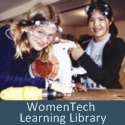Gabby Douglas Teaches Women in STEM Not To Give Up

Did you, like me, watch Gabby Douglas win two gold medals in the 2012 Summer Olympics? I was so happy when she won gold medals in both the individual and team all-around competitions. What a star!
What struck me, as I watched Gabby, was that although she made some serious mistakes throughout her routines while competing – such as her fall on the balance beam – she didn’t let it shake her, she didn’t quit, she just kept going, maintained her focus and did her best. And her reward? Two gold medals!
So often women suffer from perfectionism – which results in an all or nothing approach for them in life – that can mean that as soon as they make a serious mistake, they give up, rather than try again and keep going like Gabby. Research shows that when women get a poor or failing grade in STEM courses they think it’s because they aren’t well-suited for the field and often drop out. By contrast, men are more likely to think the problem was something external, such as a poor teacher, and repeat the course.
We have a number of articles in our Proven Practices Collection about retention of women in STEM that document this phenomenon and we are soon to add more! I also talk about how to counteract this dynamic with your female students in my WomenTech Educators online training.
Gabby Douglas shows us that you can be a champion and win the gold by being outstanding, taking your mistakes in stride and focusing on the future.
Educators, have you seen this perfectionism phenomenon in your classes with women in STEM? How have you overcome this?

2 Responses to “Gabby Douglas Teaches Women in STEM Not To Give Up”
Leave a Reply






Donna Milgram on August 29th, 2012
I think a mentoring program is a great way to help freshmen manage challenges and thrive. Your mentoring program sounds very structured and research shows these are the most successful! Thanks for letting us know about it.
ruelb on August 29th, 2012
The Women at Rensselaer Mentor Program invites all first year women (freshmen and transfer students) to be matched with a peer mentor who has the same or similar major and personal interests. In addition to one-on-one mentoring, mentors and their mentees are invited to attend monthly events. At these events, first year women meet other first year women facing similar challenges and a group of supportive mentors who have successfully navigated the first year and who share what they did to achieve academic success as well as how they met students with common interests. The program also provides monthly professional development workshops led by practicing professionals who offer advice about how to acquire professional skills important for success in college, future employment, and Graduate School.